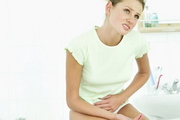 Photo: Getty Images
Photo: Getty Images
PMS stands for premenstrual syndrome. Many women get it two to 14 days before the onset of menstruation. For some, PMS is a mild annoyance. For others, it can be so severe it makes it hard getting through the day.
Doctors recognize PMS as a real medical condition, with real physical and psychological symptoms. It varies in severity and in symptoms from woman to woman and from month to month.
Just how many women suffer from PMS is hard to pinpoint. The American Congress of Obstetricians and Gynecologists estimates at least 85 percent of menstruating women have at least one PMS symptom as part of their monthly cycle.
There are more than 150 physical and psychological symptoms associated with PMS. Physical symptoms include: acne, tender breasts, trouble sleeping, bloating, constipation, diarrhea, appetite changes, and aches and pains. Emotional symptoms include: trouble with concentration, tension, irritability, mood swings, anxiety or depression.
The symptoms usually stop when your period starts. PMS goes away when your monthly periods stop, either from pregnancy or menopause.
Scientists don't know exactly what causes PMS or why some women experience it more severely than others. It seems to be linked to changes in hormone levels during menstruation. PMS isn’t caused by stress or psychological problems, although these can make the symptoms worse.
Since they are so many different symptoms associated with PMS, it can be difficult to diagnose. Doctors diagnose PMS based on symptoms, when they occur, and how much they affect one’s life. If you think you have PMS, record all your symptoms everyday and talk to your doctor. He or she will want to make sure you don’t have a condition that shares PMS symptoms like depression, anxiety, menopause, chronic fatigue syndrome, irritable bowel syndrome and endocrine system problems.
There is no cure for PMS, but a healthy diet, exercising regularly and reducing stress may help. Experts say avoid caffeine, alcohol, salt and nicotine because they can increase symptoms.
When diet, exercise and stress reduction don’t alleviate symptoms, medication may be needed. Over-the-counter medicines, such as acetaminophen and ibuprofen, can relieve cramping and other minor aches and pains. Others are marketed specifically for PMS symptoms.
Many medications require a doctor's prescription. These include diuretics, antidepressants and birth control pills. Women on the pill report fewer PMS symptoms, such as cramps and headaches, as well as lighter periods.
Don’t get discouraged if it takes time to find an option that works best for you. Treatment varies from woman to woman. Your doctor can help.
Stacy Lloyd is a writer and video producer in Phoenix, Arizona. A former television news journalist, she covered stories around the world. Currently, she produces corporate and non-profit videos and broadcast programming.




Add a CommentComments
There are no comments yet. Be the first one and get the conversation started!